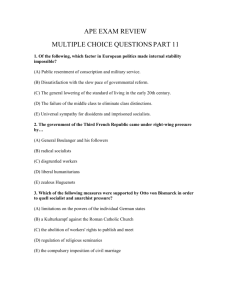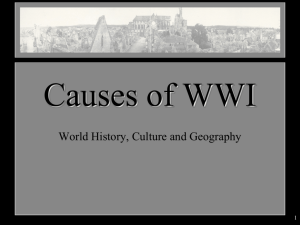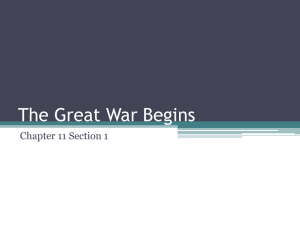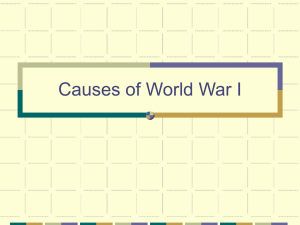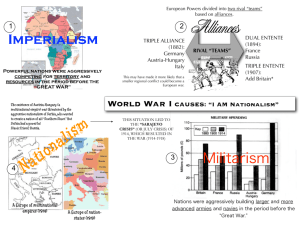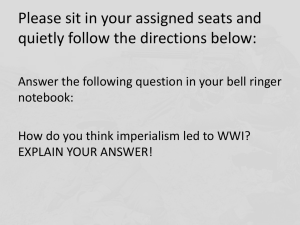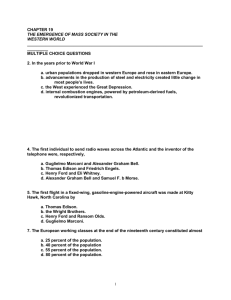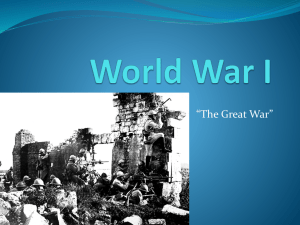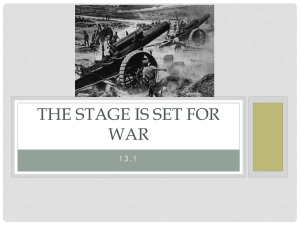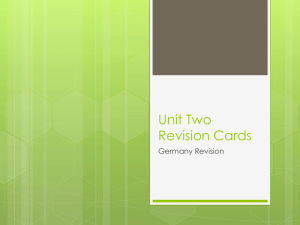File
advertisement
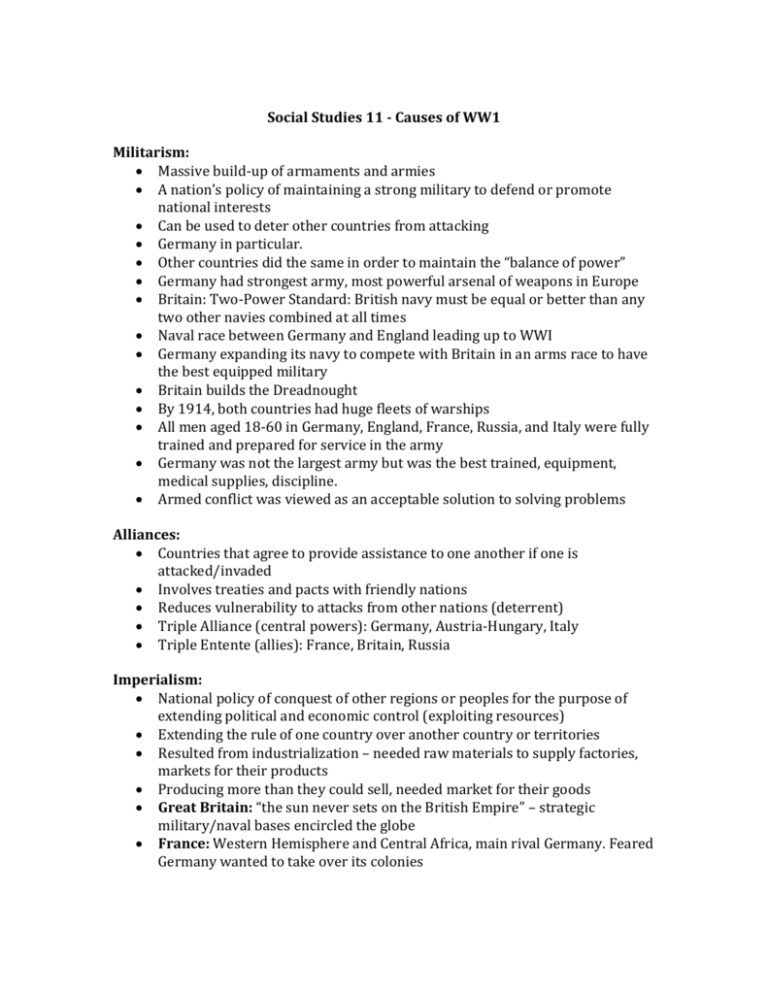
Social Studies 11 - Causes of WW1 Militarism: Massive build-up of armaments and armies A nation’s policy of maintaining a strong military to defend or promote national interests Can be used to deter other countries from attacking Germany in particular. Other countries did the same in order to maintain the “balance of power” Germany had strongest army, most powerful arsenal of weapons in Europe Britain: Two-Power Standard: British navy must be equal or better than any two other navies combined at all times Naval race between Germany and England leading up to WWI Germany expanding its navy to compete with Britain in an arms race to have the best equipped military Britain builds the Dreadnought By 1914, both countries had huge fleets of warships All men aged 18-60 in Germany, England, France, Russia, and Italy were fully trained and prepared for service in the army Germany was not the largest army but was the best trained, equipment, medical supplies, discipline. Armed conflict was viewed as an acceptable solution to solving problems Alliances: Countries that agree to provide assistance to one another if one is attacked/invaded Involves treaties and pacts with friendly nations Reduces vulnerability to attacks from other nations (deterrent) Triple Alliance (central powers): Germany, Austria-Hungary, Italy Triple Entente (allies): France, Britain, Russia Imperialism: National policy of conquest of other regions or peoples for the purpose of extending political and economic control (exploiting resources) Extending the rule of one country over another country or territories Resulted from industrialization – needed raw materials to supply factories, markets for their products Producing more than they could sell, needed market for their goods Great Britain: “the sun never sets on the British Empire” – strategic military/naval bases encircled the globe France: Western Hemisphere and Central Africa, main rival Germany. Feared Germany wanted to take over its colonies Russia: Promoted Pan-Slavism – unite the Slavic people of the Balkans – promote Slavic Nationalism Wanted to control a warm water port that was ice-free all year Austria-Hungary: Wanted to dominate the Balkans because it feared that Slavic Nationalism threatened its existence. Many ethnic groups linked to the Balkans in their territory Directly in the path of Russian aggression Germany: Southwest and East African colonies Not as economically desirable as those of France and Britain Felt it had to expand its holdings to become a great power – other countries feared German expansion Germany also wanted parts of Asia and the Pacific Belgium, Italy, and Germany had begun colonizing parts of Africa Africa was desirable because it was rich in resources such as gold, diamonds, ivory Nationalism: Sense of national consciousness that one nation is above all others Pride for one’s country – “nation-statism” Desire to preserve language, religion, traditions 2nd type - exists within an ethnic group that doesn’t have its own country Desire to be liberated from a dominant ethnic group that is different This type led to the start of WW1 (Balkans) Austria-Hungary 11 different Slavic groups in Austria Hungary that wanted independence Bosnian Serbs known as the Black Hand wanted to free Bosnia from AH Pride in one's nation (What does this create?) Assassination: With increasing tensions in Europe and countries trying to exploit as much territory as possible larger powers begin to infringe on each other creating aggression Austria-Hungary invades Bosnia which angers Serbian nationals who wanted Bosnia to be part of Serbia Became known as the “Powder Keg of Europe” Black Hand (Serbian nationalist group) gets involved June 28, 1914 – Archduke Ferdinand killed by Gavrilo Princip Blank Cheque: Germany would support Austria-Hungary even if it meant going to war Germany believed Britain would remain neutral if war broke out AH began to prepare for war with Serbia Ultimatum: told Serbia to hand over the terrorists or face war Serbia agreed to most conditions but asked for clarification which AH took as a rejection because they were looking for an excuse to go to war July 28, 1914 – Austria-Hungary declared war on Serbia Chain of Events: Russia mobilizes to support Serbia – believed Germany wanted to occupy the Balkans (Russia wanted the warm water port) Germany declares war on Russia – Germany demands that Russia demobilize, Russia doesn’t. Germany support Austria-Hungary France supports Russia – they had an alliance so France declares war Germany declares war on France – Germany felt threatened by France and Russia, ordered them to stop mobilizing, they refused, Germany declared war on France Schlieffen Plan: Germany plans to attack France through Belgium (neutral) Avoid two-front war with France and Russia Planned to use most of its army to defeat France within six weeks, then shift its attention to Russia in the East Assumed Russia would take six weeks to prepare for war Alfred Von Schlieffen assumed Britain would remain neutral and that Germany could pass through Beligium Belgian neutrality was guaranteed by Britain Britain declares war on Germany – World War 1 had begun!
